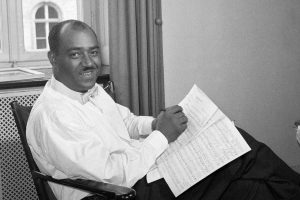Podcast: Play in new window | Download (Duration: 1:35:32 — 106.9MB) | Embed
Subscribe: Spotify | TuneIn | RSS | More
During the first season of Countermelody I presented the great African American baritone Lawrence Winters in an episode which paired him with his contemporary Robert McFerrin. Today Winters (born Lawrence Whisonant in South Carolina on 12 November 1915 and died of cancer in Hamburg at age 49 on 24 September 1965) returns center stage to Countermelody in a program which focuses on his prowess in standard operatic repertoire and art song. After vocal study with Todd Duncan at Howard University, Winters toured for several years with the Eva Jessye Choir before enlisting as a member of the Armed Forces. Upon returning to the US, he appeared in Harold Rome’s Broadway musical revue Call Me Mister. In 1948 he debuted at New York City Opera, the first Black male singer to perform there; he performed there for seven seasons, returning for a single performance as Porgy in 1962. He made his first trip to Europe in 1949 and in 1950 joined the roster of the Royal Swedish Opera, with whom he sang for two seasons. Thereafter, he joined the ensemble of the Hamburg Opera and later, the Deutsche Oper Berlin. He also performed at the Wiener Staatsoper and the San Francisco Opera. He returned to the Broadway stage in 1960, garnering a Tony nomination for his appearance opposite Joya Sherrill in the play The Long Dream. In the last year of his life he also appeared in Germany in the title role of Eugene O’Neill’s The Emperor Jones. He made a large number of recordings for Philips, Deutsche Grammophon and other labels, as well as a slew of radio recordings, many of the latter of which are featured on this episode. A certified star in Germany, Winters was often featured in pop music that appealed to the German public of the time but which, frankly, was not always worthy of his talent. In this episode I present him in repertoire that reveals him as one of the primarily Verdi and verismo baritones of his era, even when he was singing those roles in German translation. We also hear Winters in excerpts from two operas in which the protagonists are specifically Black: Frederick Delius’s Koanga and William Grant Still’s Troubled Island.
Countermelody is a podcast devoted to the glory and the power of the human voice raised in song. Singer and vocal aficionado Daniel Gundlach explores great singers of the past and present focusing in particular on those who are less well-remembered today than they should be. Daniel’s lifetime in music as a professional countertenor, pianist, vocal coach, voice teacher, and journalist yields an exciting array of anecdotes, impressions, and “inside stories.” At Countermelody’s core is the celebration of great singers of all stripes, their instruments, and the connection they make to the words they sing. By clicking on the following link (https://linktr.ee/CountermelodyPodcast) you can find the dedicated Countermelody website which contains additional content including artist photos and episode setlists. The link will also take you to Countermelody’s Patreon page, where you can pledge your monthly support at whatever level you can afford.

